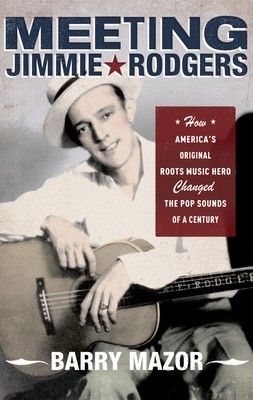
- We will send in 10–14 business days.
- Author: Barry Mazor
- Publisher: Oxford University Press, USA
- ISBN-10: 0199891869
- ISBN-13: 9780199891863
- Format: 15.2 x 23.1 x 2.8 cm, minkšti viršeliai
- Language: English
- SAVE -10% with code: EXTRA
Reviews
Description
In Meeting Jimmie Rodgers, the first book to explore the deep legacy of "The Singing Brakeman" from a twenty-first century perspective, Barry Mazor offers a lively look at Rodgers' career, tracing his rise from working-class obscurity to the pinnacle of renown that came with such hits as "Blue Yodel" and "In the Jailhouse Now." As Mazor shows, Rodgers brought emotional clarity and a unique sense of narrative drama to every song he performed, whether tough or sentimental, comic or sad. His wistful singing, falsetto yodels, bold flat-picking guitar style, and sometimes censorable themes--sex, crime, and other edgy topics--set him apart from most of his contemporaries. But more than anything else, Mazor suggests, it was Rodgers' shape-shifting ability to assume many public personas--working stiff, decked-out cowboy, suave ladies' man--that connected him to such a broad public and set the stage for the stars who followed him. In reconstructing this far-flung legacy, Mazor enables
readers to meet Rodgers and his music anew-not as an historical figure, but as a vibrant, immediate force.
EXTRA 10 % discount with code: EXTRA
The promotion ends in 22d.21:00:47
The discount code is valid when purchasing from 10 €. Discounts do not stack.
- Author: Barry Mazor
- Publisher: Oxford University Press, USA
- ISBN-10: 0199891869
- ISBN-13: 9780199891863
- Format: 15.2 x 23.1 x 2.8 cm, minkšti viršeliai
- Language: English English
In Meeting Jimmie Rodgers, the first book to explore the deep legacy of "The Singing Brakeman" from a twenty-first century perspective, Barry Mazor offers a lively look at Rodgers' career, tracing his rise from working-class obscurity to the pinnacle of renown that came with such hits as "Blue Yodel" and "In the Jailhouse Now." As Mazor shows, Rodgers brought emotional clarity and a unique sense of narrative drama to every song he performed, whether tough or sentimental, comic or sad. His wistful singing, falsetto yodels, bold flat-picking guitar style, and sometimes censorable themes--sex, crime, and other edgy topics--set him apart from most of his contemporaries. But more than anything else, Mazor suggests, it was Rodgers' shape-shifting ability to assume many public personas--working stiff, decked-out cowboy, suave ladies' man--that connected him to such a broad public and set the stage for the stars who followed him. In reconstructing this far-flung legacy, Mazor enables
readers to meet Rodgers and his music anew-not as an historical figure, but as a vibrant, immediate force.


Reviews